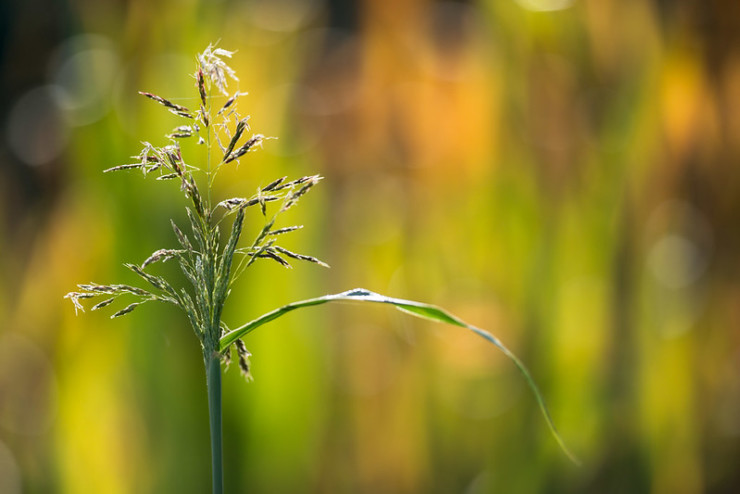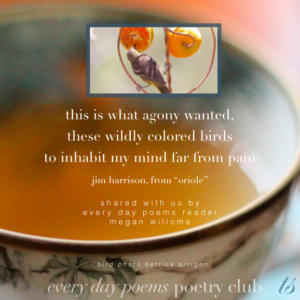Welcome to this week’s poetry club tea date!
Get your favorite steep (or brew) and join us in writing a quick poem based on the following lines, submitted by Every Day Poems reader Megan Willome. The lines are from the recent poem delivery Oriole, by Jim Harrison:
this is what agony wanted
Your Pour
Take a moment to write a poem based on the shared lines. Then add to the comment box (with a touch of cream and sugar) so other club members can enjoy.
✨
Looking for more inspiring lines? Check out the Every Day Poems poetry club room, where we feature additional favorite lines submitted by readers.
Photo by Davide Gabino, Creative Commons license via Flickr.
Latest posts by T.S. Poetry (see all)
- Braving the Poem: Interview with Catherine Abbey Hodges - March 24, 2025
- National Poetry Month Is on the Way + Prompt! - March 14, 2025
- Making & Unmaking Meaning: Interview with Wendy Wisner - March 3, 2025


L.L. Barkat says
rain against the windows,
pouring
the lacy shadows
in the aftermath
as the sun becomes
a coin of humid gold
this is what agony wanted
this is why, sometimes,
we keep the windows
closed
Bethany R. says
Love it.
“the lacy shadows
in the aftermath”
And yes, perhaps it is possible for closing to include a kind of opening.
Sandra Heska King says
“why, sometimes, we keep the windows closed”
Seems to me that sometimes we just want to live alone with agony for a bit.
Michelle Anne Ortega says
“a coin of humid gold”
Love this line!
Sandra Heska King says
Agony stilled in the rising
of the mint tea’s steam,
the aroma of a thick slice
of fresh-baked sourdough
lavished with a spread of
butter and strawberry jam.
All agony really wanted was
a little homemade love.
Bethany Rohde says
homesick
while I’m home
Sandra Heska King says
That, too, sometimes.
Bethany R. says
I appreciate the sweet comforts of your poem, Sandra. 🙂
Michelle Anne Ortega says
Yes, Sandy’s poem conjures this feel!
Michelle Anne Ortega says
Self-care goes along way. Simply and quiet. And yummy. 🙂
Megan Willome says
Snowy Owl
Diurnal after eight years on the fringe
of a forest falling around me, I allow
myself to migrate to the hills
above the hay bales between a fence post
and a grain elevator. Early one evening
two lemmings irrupt my sitting:
scurrying for food they forget they are food. Thinking
of my old habitat: this is what agony wanted,
these rodents that never hibernate to veil
my brain from loss.
Now they burrow into my conscience.
Michelle Anne Ortega says
I love that you took on the owl’s perspective, and how wisely the owl conjures poetry before, perhaps, their evening meal?
Michelle Anne Ortega says
Elegy (this is what agony wants)
Michelle Ortega
Hardware for her spine, tubes for every
organ, medication for each system to function––
who could have known that 25 years short years
would lead to this decline, that the young couple
in the pictures would be isolated in the basement
apartment during a pandemic, instead of traveling,
or off to grad school, or even a sucky part-time job
to make ends meet. Can’t get married because
the disease-care business in our country keeps
her dependent on her father’s benefits (even though
he left the family for a new wife so many years ago).
Unable to move much unassisted, too much
pain to change positions; he carries her
From their bed to my treatment table. We
prop her with pillows and blankets, she inhales
long, I strain to understand what’s happened
since I saw her last week. This is what agony wants:
for my own pain to get in the way, for the chance
to look away. But then he squeezes past us and
takes hold of her foot, and when she feels
his touch, their eyes meet––for a few seconds,
their faces radiate the levity of lovers, and
inside me softens. I remember that the stars
keep the sky from succumbing to total darkness.
Michelle Anne Ortega says
LAST LINE EDIT:
keep the night sky from succumbing to total darkness.
Will Willingham says
So fascinating to read each of these, and each writer’s perception of “what agony wanted.” I was afraid when I pulled that line that it would feel too focused on pain for pain’s sake. But you’ve each had this response to it that seems to defy the agony, to see it, to acknowledge it, even to respect it, but say, “Okay, but here’s what we’re doing instead.” In your line, “But he squeezes past us and / takes hold…” there’s that sense. Okay. But now we’re doing this.
Michelle Ortega says
I’m glad you trusted your instinct with the line! And yes, the poem helped me to see,”we’re doing this.”